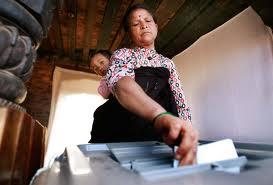
As an American living in Nepal, I’m constantly scanning the NY Times for news about this country, however there isn’t much. On some level this confounds me given the geo-political location of Nepal between India and China, its proximity to various “hot spots” of American engagement and the size of the American Embassy. I’ve found that one of my roles then, as an ex-pat living in Nepal since June 2012, and in India from 2009-12, is to try to further educate others regarding various perspectives on this part of the world.
On November 19, the second ever elections for a new Constituent Assembly (CA), based on a parliamentarian system, are scheduled to be held with the last election taking place six years ago in the Nepali year 2064 BS (2007). This is a momentous time in the history of the country as Nepal attempts to become more democratic, post the Comprehensive Peace Accord signed in November 2006 at the end of the 10 year “People’s War”. Although there is an interim Constitution in place, the last CA was unable to draft a permanent document and thus the vital importance of this election.One hundred forty (140) parties have registered, but 33 parties, including the major CPN-Maoist party did not, threatening to hold a 10 day General Strike prior to and during the election. One can already read about violence, but the Army and Police have been called out to help uphold people’s voting rights, in a non-violent manner.
Due to the interconnectedness of the world, Nepal, through its political parties, and their affiliations, is greatly influenced by other countries, specifically India and China. One can see this in imports and exports, e.g. consumer goods, energy, political rhetoric, similarities in religion and language, especially with India.
But there is also the other side, maintaining independence through using a Nepali calendar based on the lunisolar Hindu calendar with the year beginning in the month of Baishakh; usually around 14 April. The official Nepali calendar follows BikramSamwat, abbreviated B.S., started by Indian emperor Vikramāditya. The B.S. year is 56.7 years ahead of the Gregorian Calendar. Nepal also has its own time zone, i.e.15 minutes ahead of India.
This is the struggle that takes place in Nepal on a daily basis, a need to be independent but also a need, as a so called “developing country”, to accept “influence” through large amounts of foreign aid. For the fiscal year 12/13 this totaled approximately $1.16 billion. Nepal is a country rich in resources, especially water/hydro power and as most of the world knows the Himalayas, which are seen as a major tourist attraction for trekkers. However unemployment is extremely high and large numbers of men and women can be found working overseas and sending remittances home in order to help maintain their families.
One major focus for me is Nepal’s location between two gigantic economies and world powers, i.e. India and Nepal. This election then is important as to how the majority party, or coalition government, which is more than likely, will work with the rest of the world, especially its neighbors. In its manifesto the UPCN-Maoist Party excludes the doctrines of the UN Charter and non-alignment, the fundamental features of the country’s foreign policy. The Nepali Congress and CPN-UML vow to conduct foreign policy by sticking to the UN Charter, Panchasheel, i.e. principles of peaceful co-existence, and principle of non-alignment.
It won’t be the world’s best interests if after the election Nepal decides to further align itself with any specific country as opposed to furthergetting on track and setting its own political and development agendas based on the will of the country’s citizens. With growing populations and the need for further resources, especially related to energy to drive their economic engines, both India, which Nepal shares “porous” boundaries with, and China, with their encroachments into Tibet, may need more land for their citizens; without an independent Nepal, my fear is that on some level, the country will continue to be “gobbled up” through political influence or the shifting of geographical boundaries.










Add new comment